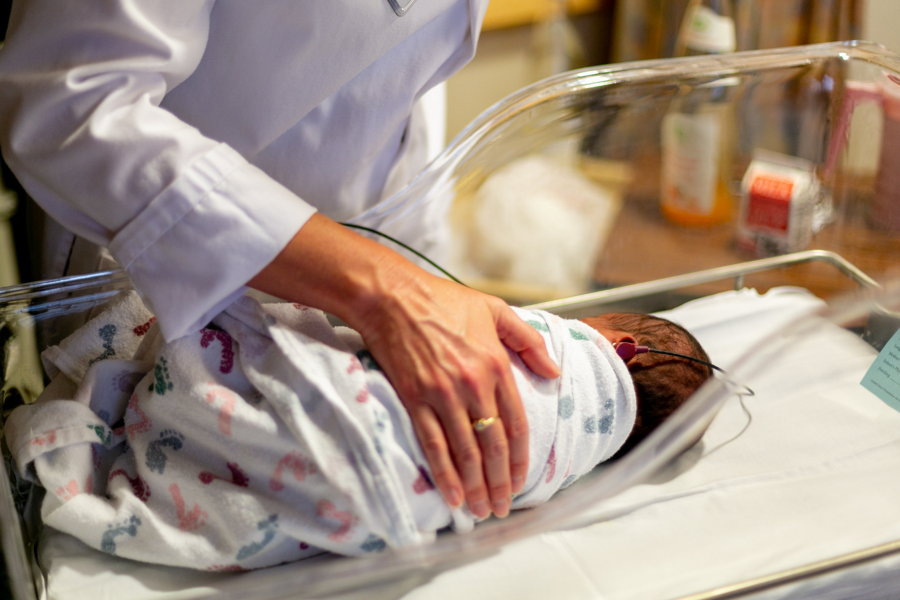
Clinical Practice
The Role of Neonatal Nurses in Supporting Parent-Infant Bonding in the NICU
-
 EveryNurse Staff
EveryNurse Staff
- Last Updated: 09/30/2023

Neonatal nurses play a vital role in supporting parent-infant bonding in the Neonatal Intensive Care Unit (NICU). The bond between parents and their newborns is a precious and essential foundation for the infant’s overall development. In this article, we will explore the importance of parent-infant bonding, the challenges faced in the NICU environment, and the crucial role of neonatal nurses in facilitating and promoting bonding between parents and their babies.
The Importance of Parent-Infant Bonding
Parent-infant bonding refers to the emotional connection that develops between parents and their newborns. This bond forms the basis for a secure attachment, which is crucial for the infant’s emotional, social, and cognitive development. Parent-infant bonding establishes a sense of trust, security, and love, creating a nurturing environment that promotes healthy growth.
The Science Behind Parent-Infant Bonding
Parent-infant bonding is a complex process influenced by various biological and psychological factors. Oxytocin, often referred to as the “love hormone,” is released during childbirth and breastfeeding, promoting feelings of warmth and affection between parents and their infants. Skin-to-skin contact and positive interactions also stimulate the release of oxytocin, further strengthening the parent-infant bond.
The Impact of Bonding on Infant Development
A strong parent-infant bond has numerous benefits for the infant’s development. Bonding fosters healthy emotional and social development, promotes secure attachment, and enhances cognitive and language skills. Infants who experience secure bonding are more likely to develop positive self-esteem, better coping mechanisms, and healthy relationships throughout their lives.
The Challenges of Bonding in the NICU
Bonding in the NICU setting can be challenging due to various physical and emotional factors. Neonatal nurses play a crucial role in addressing these challenges and creating an environment that supports and nurtures parent-infant bonding.
Physical Barriers to Bonding
In the NICU, infants may require specialized medical interventions, such as incubators, tubes, and monitors, which can create physical barriers to bonding. These barriers can make it difficult for parents to engage in typical parent-infant interactions, such as holding and feeding their baby. The presence of medical equipment and the clinical environment can create feelings of disconnect and helplessness for parents.
Emotional Struggles for Parents
Parents of infants in the NICU often experience a range of emotions, including fear, anxiety, guilt, and grief. These emotional struggles can affect their ability to bond with their baby. Concerns about the infant’s health, uncertainty about the future, and limited access to their baby due to medical procedures can intensify the emotional challenges faced by parents.
The Role of Neonatal Nurses in Facilitating Bonding
Neonatal nurses play a pivotal role in promoting parent-infant bonding in the NICU. They provide support, education, and guidance to parents, empowering them to establish and strengthen their bond with their newborn.
Providing Education and Support to Parents
Neonatal nurses educate parents about the importance of bonding and provide guidance on how to engage with their baby in the NICU setting. They explain medical procedures and help parents understand their infant’s condition, providing reassurance and emotional support. By addressing parents’ concerns and providing information, nurses empower parents to actively participate in their baby’s care, strengthening the parent-infant bond.
Implementing Bonding-Friendly Policies and Procedures
Neonatal nurses advocate for bonding-friendly policies and procedures in the NICU. They collaborate with healthcare teams to create an environment that encourages and supports parent-infant bonding. This may involve implementing practices such as family-centered care, flexible visiting hours, and open communication between healthcare providers and parents. By fostering an atmosphere of trust and collaboration, neonatal nurses promote bonding and empower parents to be active participants in their infant’s care.
Strategies for Improving Parent-Infant Bonding in the NICU
Several strategies can enhance parent-infant bonding in the NICU, and neonatal nurses play a vital role in implementing these strategies.
Potential Changes in NICU Design
Reimagining NICU design to create a more homelike environment can positively impact parent-infant bonding. Creating private spaces for parents, incorporating comfortable seating areas, and providing accommodations for parents to stay overnight can enhance their involvement in their infant’s care and facilitate bonding opportunities.
The Power of Skin-to-Skin Contact
Skin-to-skin contact, also known as kangaroo care, is a powerful method for promoting bonding in the NICU. Neonatal nurses encourage and facilitate skin-to-skin contact between parents and their infants, even in the presence of medical equipment. Skin-to-skin contact promotes bonding, regulates the baby’s temperature, stabilizes vital signs, and supports breastfeeding.
The Role of Breastfeeding in Bonding
Breastfeeding is not only a means of providing optimal nutrition for the infant but also a powerful bonding experience between parent and baby. Neonatal nurses provide education and support to parents on breastfeeding techniques, assist with establishing breastfeeding routines, and ensure a supportive environment for breastfeeding in the NICU.
Conclusion
In conclusion, neonatal nurses play a crucial role in supporting parent-infant bonding in the NICU. By providing education, emotional support, and implementing bonding-friendly practices, they create an environment that nurtures the parent-infant bond.
Through strategies such as potential changes in NICU design, promoting skin-to-skin contact, and supporting breastfeeding, neonatal nurses empower parents to establish and strengthen the vital connection with their newborns. By facilitating and promoting parent-infant bonding, neonatal nurses contribute to the overall well-being and development of infants in the NICU.
















